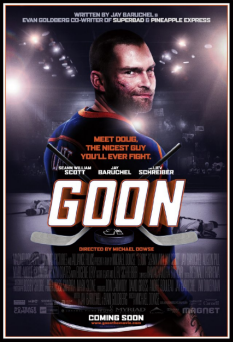By Michael Scoular (The Cascade) – Email
Print Edition: February 29, 2012
 Contrary to how current events have changed the way we think about hockey enforcers, Goon doesn’t care about prodding the topic; instead skiming along its surface seeking to create laughs, existing mainly to relocate sports tropes north of the border and to serve as a star opportunity for an overeager writing-and-producing Jay Baruchel.
Contrary to how current events have changed the way we think about hockey enforcers, Goon doesn’t care about prodding the topic; instead skiming along its surface seeking to create laughs, existing mainly to relocate sports tropes north of the border and to serve as a star opportunity for an overeager writing-and-producing Jay Baruchel.
That’s not to say Goon doesn’t succeed at what it sets out to do, however modest that may be. Baruchel and co-writer Evan Goldberg are adept at drawing caricatures to fill out the ranks of the hockey team Doug Glatt—he of the modest aims and long reach—unexpectedly makes after a YouTube-impressing, attendance-rousing knockout. Less successful is Jay Baruchel’s self-anointed “lovable wisecracking sidekick,” whose comedy act consists of him laughing at his own readings of 1001 Sex Jokes That Will Impress Your Friends. Baruchel appears to be much better when not writing his own material, but his character’s self-satisfied grin follows Glatt around the league ranks, infecting an otherwise effective comedy of awkward restraint and violent indulgence.
Goon also dabbles in drama, primarily in the case of Glatt’s disapproving family, whose patriarch is Eugene Levy, and whose main complaints stem from the brutality of the “sport” and what future, if any, such an endeavour has. Lacking the foresight a timeless comedy like Slap Shot seized, these queries are discarded with a callous “Fuck your parents if they can’t get behind what you’re doing,” courtesy Baruchel. And this is the main problem with Goon. While Sean William Scott plays the Canadian politeness up with a dumbfounded dignity that makes him as affable an enforcer as the real ones that play the game often are, the movie refuses to even dip its toe in the real world. Slap Shot proved real concerns do not have to compromise comedy, but don’t expect any of the caricatures here to contemplate life after hockey, even in jest; don’t expect the corporate logos over the scoreboard to be questioned; and certainly don’t expect the humanity of the people devoting the best years of their lives to second tier hockey and the people paying to see them do so ever brought up. Allison Pill, as Glatt’s crush, is a misogynist cipher, and in the absence of any kind of obstacles in the movie’s first two thirds, Glatt’s family is an invented villain, a missed opportunity.
Michael Dowse, who made his name with the Canadian cult film FUBAR, establishes a comic atmosphere that carries through to the final shot. Dialogue scenes are cut short; games are condensed to a few obscured goals and slow motion-emphasized fights. It’s clear where Dowse is aiming in tone, but in going for blood splatter rather than characters with actual blood, Scott’s performance is curtailed into a mutilation for yucks. George Roy Hill was able to achieve a better balance, an intimacy with both the smooth skating and the ugly brawls on the ice that spilled over into the dialogue that at least reached for what a locker room would sound like. Newman’s line of “we’re humans, you know” is unthinkable here.
Baruchel’s brand of writing and Dowse’s direction both aid the comedy well enough—this is a funny movie once the hockey takes over and Baruchel is relegated to the sidelines—but Goon follows a formula, rather than breaking it as its renegade attitude would hopefully suggest. Glatt, after all, just wants to disappear into, and be part of, a group.


